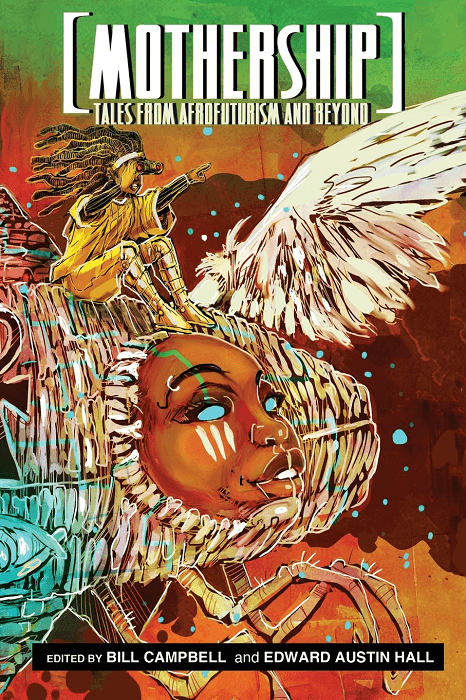This month’s review is of Mothership: Tales from Afrofuturism and Beyond, an anthology that came out in 2013. It sets itself as an invitation to readers to explore the range of speculative fiction written by people of color in America. I wanted to survey the field, so I bought the book. The book, like the field it surveys, is huge. It includes 40 short stories, ranging in size from “flash” fiction of barely 500 words to much longer treatments. If you’re looking for something you can take your time and wander through, this much content can’t be beat.
But is it good?
Oh, yeah, it’s good.
There are some ringers in here, to be sure. Well-known speculative fiction authors like N.K. Jemisin, Daniel José Older, Charles R. Saunders, and Nisi Shawl are included. These are talented authors whose works have earned fans and awards. I expected them to deliver and they didn’t disappoint. Jemisin and Shawl bend scientific philosophies into the most personal of stories; Saunders paints a dream of an Africa that never was or maybe we’ve just forgotten; and Older just brings it, with a story that is funny and a little terrifying and terrifically satisfying one after the other. If you want to own some material from these folks, then this is a safe bet. It is also a good move by the editor to open and close with known successful writers, thereby baiting readers into reading unknown authors and maybe finding something new to enjoy.
Don’t misunderstand: All the authors pull their weight. There’s no fluff in this anthology. A number of the stories require some research and hard thinking from the reader – you’ll want to hit the Google more than once to really get all the goodness out of some of these – and that’s its own recommendation.
The writers take you all over the map — Fantastic India with a story of romantic love coming, going, and returning again in The Parrot’s Tale (Anil Menon) — gang warfare and intergalactic viruses in the airless void of a Lunar cyberpunk colony with Skin Dragons Talk (Ernest Hogan, but not the famous ragtime Ernest Hogan) – one of the best examples of spoken dialect I’ve ever read, and one fine, fine wine-in’ brother in A Fine Specimen (Lisa Allen-Agostini) – a haunting, touching tale of bloodsucking and loss in Africa in One Hundred and Twenty Days of Sunlight (Tade Thompson) – It was like I got to spend the month of August at a buffet in Vegas and I have left fat, and perhaps still a little drunk.
If anything my critique is that there is too much material here. There isn’t a bad story in the collection, but there are some that are repetitive, or that don’t add anything to the conversation. There are even a few that are so predictably plotted that they almost cross the line into stereotyping. But with a volume this good, those are easy to skip without feeling any great loss.
Now, to be completely honest, my big question is about the title itself. What constitutes “Afrofuturism” in the title? Sure, there are stories here that are firmly Science Fiction/Fantasy centered on Black characters and Black lives. But most of the stories in the anthology are hidden behind the “and Beyond” in the subtitle. [quote_right]”Don’t misunderstand: All the authors pull their weight. There’s no fluff in this anthology. A number of the stories require some research and hard thinking from the reader…”[/quote_right]There is magical realism, some horror, even stories that are just…stories. Every ethnicity is represented in the author list; however all of the characters are explicitly non-white – Native American, American Black, Caribbean, African, Indian, Arabic. There isn’t an undescribed White male or female main character in the bunch. That dedication to the diversity of characters – it even extends to not all of the stories being about straight people – is awesome and part of what made this book so refreshing to read. But it would have been much more telling for the editors to have centered the world-spanning, genre-spanning nature of this anthology right there on the cover. Maybe “Speculative Fiction by and about People of Color” or something similar would have better represented the contents. Or at least it wouldn’t have left me feeling like someone had promised me P-Funk, but they only played the one song you always hear on the radio, turned down low.
In thinking about the title, about Afrofuturism as a field, I want to keep wandering. My next review will be a full novel, not another anthology. I’ve elected to make my first choices not based on names and novels we may be most familiar with, but to explore the novels of some of the short story authors I’ve liked so far. I’ve browsed long enough, time to dig deeper.
I can whole heartedly recommend this anthology. A lot of the authors, particularly the ones I linked to above, have first or second novels coming out in the next year. Read it and expand your reading list. I know I have.



Show Comments